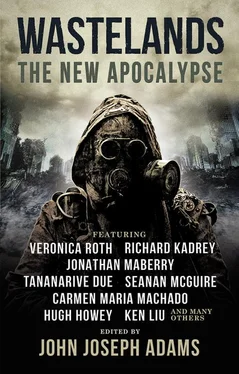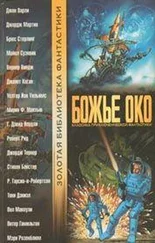“You were right,” Karen said, “I packed too much.”
“It’s OK.”
Karen’s sigh was more a silent wail. “Nothing is OK, Nayima.”
“I mean don’t worry about it now. When we get there, decide what to leave behind.”
She saw Kyle’s slack, sleeping lips like a photograph. I’m sorry , she whispered to him. She had to leave Kyle behind too if she was going to make room for Karen. Or anyone.
Now that the day had arrived, she almost hoped no one would come see the show. She and Karen needed the extra water for themselves. Karen had been honest about what she thought, and at great cost. Honesty was the greatest treasure left; maybe the only one that mattered.
“I’ll try not to be like this all the time,” Nayima said. “I can be better.”
“Me too,” Karen said.
Nayima’s heart sped with the rising tide, as if it were wind pushing her. As soon as the show was over, if there were a show at all, she would search the driveways and parking lots for a working car with keys. Maybe she could get one to start. She’d once found a PT Cruiser that had driven her straight to paradise, and maybe she could find a vehicle that would let her drive there again.
They could.
The skyline shone in the barest pink, just enough to show the silhouette of the pier’s sign ahead. And below it… vague shadows. Movement. Or was it her imagination?
“Someone’s there,” Karen said.
Karen sounded happy, but Nayima’s chest cinched with ice. Silently, Nayima held out her arm to stop Karen’s quickening pace. She gestured to the side, and they crouched behind a Dumpster on the side of an old surf shop. Karen groaned from the weight of her pack.
As the light grew, Nayima recognized The Old Man in the Sea. He had brought a folding chair and was already sitting, dressed as he’d been the day before.
“Holy shit,” Nayima said. “He came.”
Karen clasped her shoulder and shook her. “Aren’t those the kids and their dad? Look. Over by the sign?”
The father and his two children looked elephantine in silhouette because they were wearing gas masks, but they were ten yards from the old man, keeping distance even from each other. Four! Four was a good crowd, half of the town’s remaining population.
But two were kids—she would have to keep her act clean.
Since no marshals were in sight, she and Karen resumed their walk to the pier. She chose a spot a few yards away from the old man’s chair, far closer to the PCH than she’d planned, but she didn’t want to ask him to move. She would do her routine without looking at the cars.
Nayima felt shy beneath the strangers’ stares, under the weight of what they needed and her promises to them. She opened her backpack and stood ten water bottles upright, fighting common sense that told her to keep it.
“Here’s the free water,” she said. “It’s desalinated, but go on and boil it. I boiled the bottles too, but you can use gloves.”
When Nayima stepped back, no one stepped forward for the water. Good.
She measured the space in the center of the pier’s walkway to set up her crates. While Karen offered her a hand to steady herself, Nayima climbed up and tested her balance with one foot on each. The crates were not quite even, rocking her like she was surfing.
Nayima wished the sun rose in the west, but the dawn sky was growing bright with resolve, washing everything in pink and lilac like the colors of her thumbtacks.
“We’re up here!” she heard Karen shout out behind her, motioning to someone from farther down the pier. Nayima hoped Karen had sense enough not to be hailing marshals.
“There’s, like, six more of them,” Karen told her, excited.
Two members of the Brat Pack had come in dust masks and blue gloves, a new young couple who looked carefree in beach clothes and light jackets. Most of the faces were new: a brown man with three women of different hues, all of them taller than him, all four of them hiding their faces behind clean, colorful scarves. Their clothes were clean too. One of the women was wearing perfume, even.
“Are you from Sacramento?” one of the women said, hopeful inside her purple scarf.
Nayima shook her head. She repeated her spiel about the free water, so the woman in the purple scarf walked up to take a bottle in her gloved hands. She motioned to Nayima, asking if she could take two, and Nayima nodded. The woman offered one bottle to the old fisherman, and he shook his head, waving her away. He was not wearing gloves.
Nayima counted: twelve people had gathered in Malibu! She had not been in the company of so many others in more than a year, almost since the plague began.
“It’s great to be here!” Nayima proclaimed.
The crowd, stone silent before she’d spoken, transformed into a rousing amen corner. The old man was already smiling. Their clapping was muted by their gloves.
Nayima was so shocked by their response that she almost forgot her first joke. She’d planned to open with the joke Karen liked about Malibu prices going down, but it felt wrong now, especially with the car tombs in view. Why were most of her jokes about the lost?
She blurted: “I went swimming in the ocean the other day—my friend said, ‘Aren’t you afraid of the sharks?’ I said ‘No, I’m only afraid of the lifeguards.’”
She’d rushed it. Her delivery had been bland.
But their laughter nearly rocked Nayima from her unsteady crates. The bearded man laughed so loudly that the approaching tide could not smother him. He pointed at her, head turned over his shoulder to be sure everyone knew she was there. Farther back, the children squealed and tugged at each other, until their father separated them. Most of them applauded.
Nayima told every joke she could think of, every joke she had ever known. She raised her voice until she was hoarse so everyone would hear her punchlines. Their smiles were hidden, and sometimes the waves drowned them out, but she saw laughing in their eyes. She luxuriated in so many eyes. Especially Karen’s—staring at her as if she were the goddess Yemayah rising from the sea.
Nayima smiled at Karen, her hand over her heart to say: I love you . She didn’t know if it were true yet, or if loving was possible anymore, but Karen deserved to be loved as much as these strangers deserved to laugh. As much as these children deserved a childhood. As much as they all deserved a memory without claws.
Nayima did not stop her show—not at first—even when she heard the faraway chop-chop - chop sound of helicopters and saw the swarm of black dots advancing in the morning sky.
BLACK, THEIR REGALIA
DARCIE LITTLE BADGER
Darcie Little Badgeris a Lipan Apache geoscientist and writer. Her short fiction, nonfiction and comics have appeared in multiple places, including Love Beyond Body, Space, and Time, Strange Horizons, Fantasy Magazine, The Dark , and Deer Woman: an Anthology by Native Realities . She currently lives on both coasts but will always be home along the Kuné Tsé.
Outside, the quarantine train was unblemished white. Where its tracks skirted populated regions, barbed wire and warning signs—DANGER! ¡PELIGRO! INFECTIOUS MATERIALS! ¡SUSTANCIAS INFECCIOSAS!—discouraged trespassers from marking the cars with spray paint.
The interior was another story. In her cabin, a narrow sleeper with four beds (one for Screaming Moraine, one for Fiddler Kristi, one for Drummer Tulli, and one for their carry-on luggage, several densely packed grocery bags, and an electric violin), Tulli found graffiti scrawled near her upper bunk.
Amber Smythe was here
I LOVE JON HUYNH
Kallie + Brett + Austin Klark August 17-18
FOR A GOOD TIME, CALL THE CDC
god help us
Tulli fished a leather-piercing needle from her sewing kit. With marks like spider silk, she etched: The Apparently Siblings rode the White Train .
Читать дальше


![Nick Cracknell - The Quiet Apocalypse [= Island Zero]](/books/28041/nick-cracknell-the-quiet-apocalypse-island-zero-thumb.webp)









